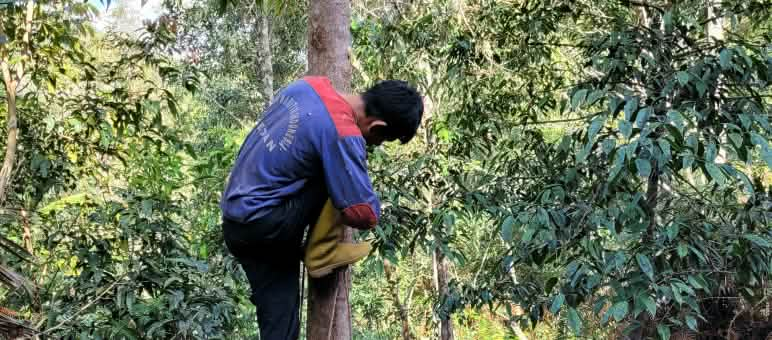
A man-made disaster: Mega-plantations in the rainforests of Sumatra
Indonesian mega-plantations are consuming millions of hectares of forest and destroying the livelihoods of smallholders. A brief look at the reality of the "Food Estates" of North Sumatra.
In 2020, Indonesian environmentalists sounded the alarm: The government was pushing through plans for new mega-plantations in the middle of the pandemic. Huge industrial farms for growing rice and other agricultural commodities – so-called Food Estates – were given top priority, ostensibly to ensure food security.
The plans call for millions of hectares of rainforest to be cleared in Borneo, Sumatra and Papua for the mega-plantations. More than four million hectares of plantations are planned – a total area roughly the size of the Netherlands.
The first Food Estate is to be created on the deforested and drained former peat forests of Borneo, an area that urgently needs to be re-wetted and reforested. Rainforest Rescue responded to this with a petition, "NO to “Food Estates” in the peat forests of Borneo!", which has been signed nearly 170,000 times.
The four million hectares of Food Estates will devour about three million hectares of rainforest, according to Swallowing Indonesia's Forests, a 2021 study by Rainforest Rescue and other organizations.
In 2020, soldiers were put to work on the project and the protests by local people ignored. Under the command of the military and with investments by major corporations, corn, potatoes, onions, cassava and vegetables are to be produced in addition to rice.
The first Food Estates in North Sumatra have been established in the meantime. In our analysis, Food Estates are a threat to the rainforest and food sovereignty. The project is abruptly forcing industrial agriculture onto a country in which most farmers still use traditional methods.
Below is a brief summary of the results of our analysis. The full text is currently only available in Indonesian.
Case Study: Food Estates in North Sumatra
-
To date, Food Estates have been established on 1,000 hectares of land. This is set to expand to 75,817 hectares over the next three years.
-
The land on which the Food Estates have been established are partly traditional farmland, partly cleared forest.
-
The Ministry of Forestry has issued special regulations covering the conversion of forest into Food Estates. The forests of North Sumatra are in danger if the program is not stopped.
-
The "Omnibus Law", which also came into force in 2020 during the pandemic, serves industry interests, making it easier for the mega-plantations to take land and clear forest for industrial agriculture.
-
Despite the ruling by the Constitutional Court suspending the Omnibus Law and calling for its revision, preparations for new mega-plantations continue.
-
The forest is an important source of income for the peasant families of North Sumatra, as the Sumatra benzoin tree (Styrax benzoin), the resin of which is used for incense and perfume, grows only there.
-
Food Estates go hand in hand with land grabs. Even protected forests are in danger.
-
Deforestation leads to a greater danger of floods and landslides.
-
Smallholder families are contractually trapped: They are told what to plant and when to work, without regard to soil conditions, harvest times, weather or other factors.
-
Working hours are also prescribed, leaving farmers with no time for their own fields.
-
The first step into industrial agriculture means the immediate loss of food sovereignty. Farming families feel like little more than automatons working for the profits of investors.
-
Environmental and social impact assessments are lacking.
-
The first year has shown that the harvests are very meagre because the Food Estates disregard the ecology and the wealth of experience of the farmers.
-
No lessons have been learned from experiences with similar mega-projects such as the one million hectare rice project in Borneo in the 1990s and the Merauke Integrated Food and Energy Estate from 2010 onwards. Large areas of rainforest and peat forest were destroyed for those projects, which failed economically and left degraded soils and high carbon emissions in their wake. They also led to human rights violations, destroying smallholder agriculture and the livelihoods of indigenous people.
-
According to the Indonesian government, the goal of the Food Estate program is food security. In reality, however, the program is biased toward industrial, high-yield, export-oriented agriculture.
This page is available in the following languages:

NO to “Food Estates” in the peat forests of Borneo!
The vast peat bog forests of Borneo could soon be destroyed for industrial rice farms. Nearly 200 Indonesian NGOs and conservationists are saying NO! to the plan.

Biodiversity
Life on Earth originated around 4 billion years ago. Since then, an unfathomable number of species have evolved, around half of which are insects. Numerous plant and animal species have yet to be documented, and many new ones are being discovered every day.